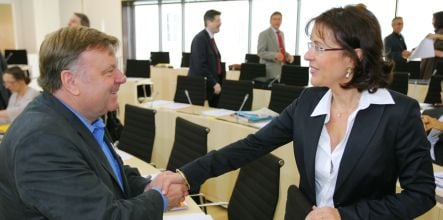Fifteen percent of those interviewed for a Forsa study commissioned by Stern magazine and broadcaster RTL would vote for the Left party if elections were held now. That’s the best-ever showing for the new party in the weekly poll.
The SPD has stagnated at 20 percent for weeks while the CDU, which governs the country together with the SPD, remained in the lead with 37 percent.
Former SPD voters have defected in droves to the new Left party after they became disenfranchised with tough labour market reforms introduced under Chancellor Gerhard Schroeder. The Left party encompasses the socialist PDS party popular in former East Germany with an association of far-left voters in western Germany.
Most blame the SPD’s latest woes on the party’s chief in the central state of Hesse, Andrea Ypsilanti. Ypsilanti has said she plans to form a coalition government with the Greens and the tacit approval – but not the participation – of the Left party in the central state. Her plans include cutting deals with the Left to allow her to be elected state premier.
She had promised not to work with the Left as she campaigned for a January election that gave no party a clear majority in the state.
“The risks for the political scenarios in Hesse are inacceptable,” said Finance Minister and SPD vice-chairman Peer Steinbrück in a Stern interview. “She’s putting herself in the hands of a party that would be influential without responsibility, without commitment, that eats away at the ability to govern every week.”
In a second Forsa survey commissioned by Stern and daily Frankfurter Rundschau, 59 percent of voters in Hesse opposed Ypsilanti’s coalition plans and 68 percent were against the agreements that will win her the state premier seat.
Sixty-one percent of those interviewed said they favour new elections to clear up the impasse – something the SPD opposes because they would most likely fare far worse than the 39 percent of votes they won early this year.




 Please whitelist us to continue reading.
Please whitelist us to continue reading.